Posts Tagged ‘unsolicited feedback’
If you visit family and friends this holiday season. you may receive unsolicited feedback and advice. Sometimes people who care and want what’s best for us, provide input we didn’t ask for.
Unsolicited feedback at best feels like someone is trying to help, at worst it feels like criticism. Underneath the feedback might be the message, “If you were doing this right, I wouldn’t need to give you this advice.” I put unsolicited feedback and advice in the same bucket.
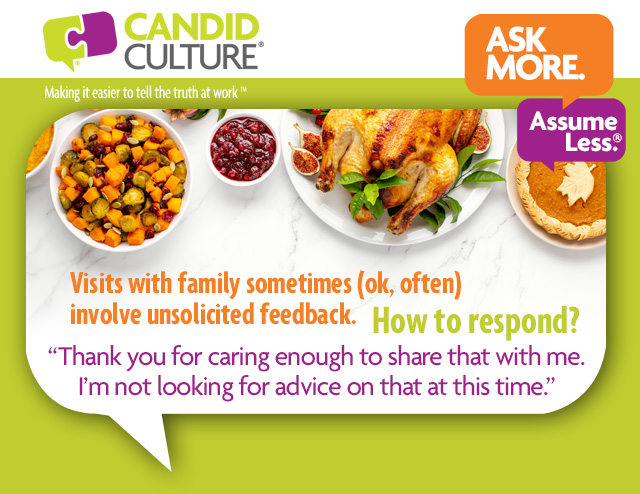
If you find yourself receiving unsolicited advice, you don’t have to smile politely and take it. It’s ok to put an end to feedback and advice.
Simply smile, tell the person you appreciate them caring enough to give you that advice, and say that you’re not looking for advice on that topic at this time. And then smile again. Smiling softens most messages. Say nothing more. Most people will stop talking. What else is there to say?
This method of acknowledging the person talking is respectful and firm. To pull it off, watch your tone. If you can safely add the words, “you dummy” to anything you say, you have a tone issue. Be genuinely appreciative and enforce boundaries. You’re not the 7/11. You don’t have to be open to feedback and others’ input all the time.
If the person continues giving you advice, simply say the same thing again. “Thank you for caring enough about me to share that with me. I really appreciate your concern. And I’m not looking for advice on that at this time.” If the person keeps talking, just say, “I’m going to get a drink.” Then get up and go get a drink.
If stopping unsolicited feedback feels uncomfortable, prevent it. Tell people before you see them, “I don’t want to talk about _____________ (fill in the blank). Please don’t bring it up over Thanksgiving.” You can soften that request any way you like.
Most difficult conversation are preventable. And preventing a difficult conversation is always easier than having one.
Setting boundaries might be feel uncomfortable. But it’s likely not as uncomfortable as having a conversation you don’t want to have and then feeling like you need to avoid someone for the rest of the evening and possibly year. It’s ok to say, “No, thank you. Please pass the pie.”
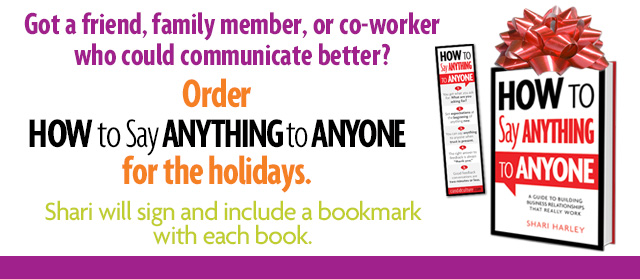
People sometimes leave feedback training confused. Armed with the skills to be candid, they think they have the right to say anything they want. Not the case. Feedback isn’t a weapon or a license to barf your opinion on people. Unsolicited and unwelcome feedback is like fish you left on your counter top for too long. It stinks.
You have the right to ask for and accept the feedback you want and reject the feedback you don’t, from peers and customers. Help people know the difference by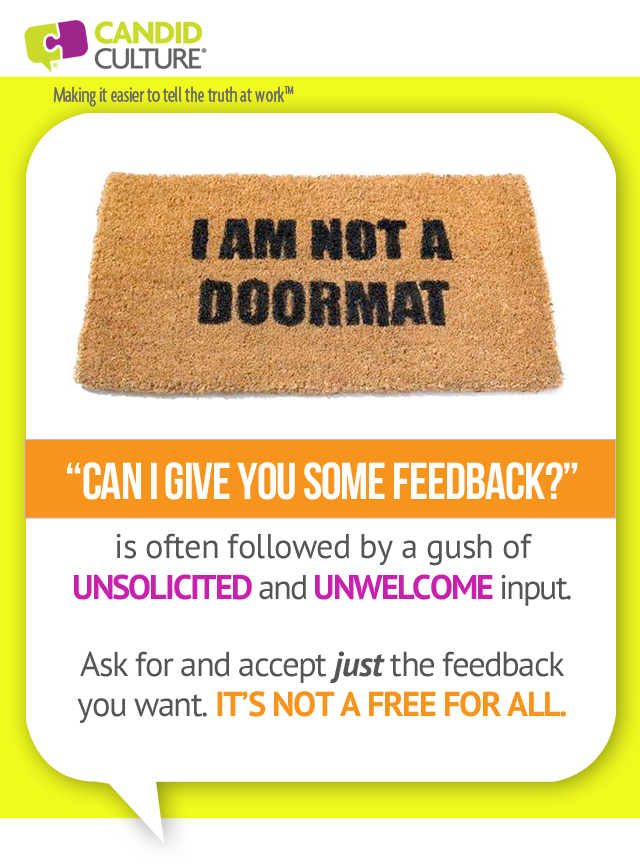 providing clear parameters on what type of input you do and don’t want. You are not a dumping ground.
providing clear parameters on what type of input you do and don’t want. You are not a dumping ground.
Follow these steps to manage the feedback you get from others:
Giving and receiving feedback tip one: Don’t ask for feedback because you think you’re supposed to. There are lots of leadership books and training programs that tell leaders to be open to and ask for others’ input. Only ask for input you want. If you’ve made a decision or don’t want others’ input, don’t ask for it. While you might get more buy in by asking people for their input on decisions that impact them, you’re allowed to decide without forming a committee.
Giving and receiving feedback tip two: When you ask for input, be very specific about the type of input you want. Guide people. Tell them, “I’m specifically looking for input on ____________. I’m not looking for input on ____________.” And if you still receive unwanted feedback, remind people about the input you are and aren’t looking for. In the spirit of being helpful, people can overstep their bounds.
Giving and receiving feedback tip three: Don’t be afraid to shut people down who provide unsolicited feedback. The words, “Thank you for your concern. I’m not looking for input on that at this time” will do the trick. Yes, you really can say that.
Giving and receiving feedback tip four: Don’t take feedback personally. While most people don’t think about it in this way, giving feedback subtly tells you that you’re doing something wrong, or at least not how the other person would do it. There are lots of ways to skin a cat. Their way may or may not be better than yours. To “skin a cat” is a terrible expression, by the way.
Giving and receiving feedback tip five: Trust yourself. You likely know what you want to do a lot of the time. If you find yourself asking for input when you know what you want to do, stop asking. Listen to your gut and decide.
Feedback has a time and a place. I ask for and listen to a lot of feedback, but not all the time and not about everything. If I listened to everything everyone in my life suggested, I wouldn’t own a business or have a baby. Sometimes you know best.
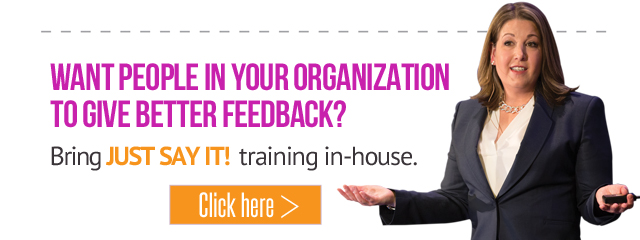
Just because you can say something, doesn’t mean you should.
There can be too much candor and feedback.
A few guidelines to consider before giving feedback:
- Ask yourself, was the feedback solicited? Unsolicited feedback rarely goes over well.
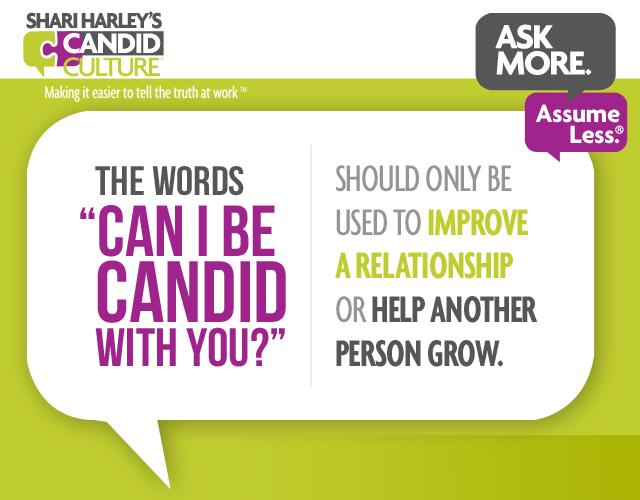
- Assess if you have the relationship to give feedback. I’m offered all sorts of feedback from people I don’t even know. People I don’t know haven’t earned the right to give me feedback.
- Determine if you’re trying to strengthen the person or the relationship. If you aren’t trying to help someone improve, AND the feedback isn’t requested, AND you don’t have the rapport to give feedback, say nothing.
Feedback recipients don’t have to accept unsolicited input or advice. It’s perfectly acceptable to put limits and boundaries on the input you’re open to from peers, friends and family.
Here are two tips for how to handle negative feedback:
How to handle negative feedback tip one:
When you ask for feedback, be very specific about what type of feedback you want.
For example, you could say something like, “We’re picking a new software application to track leads. I’ve already narrowed the choice down to three vendors and vetted what each software application can and can’t do. I want to know about things I may not be aware of, like software that’s being phased out and won’t be supported and potential bankruptcies.”
There’s nothing wrong with asking for targeted feedback. Simply tell people what kind of feedback you want and why. And avoid asking open ended questions like, “What do you think?” If you ask a broad question, you’ll likely get a broad answer.
How to handle negative feedback tip two:
Tell people if you aren’t looking for feedback.
For example, you could say something like, “Thank you so much for your concern. I really appreciate it. I’m actually not looking for feedback at this time. But I really appreciate your concern.”
There’s NOTHING wrong with setting limits and boundaries about what kind of input you’re seeking. And when you do set those limits, intrusive people will think twice before offering unsolicited advice in the future.

During the holidays we often see people we haven’t seen in a long time. Your family and friends care about you and want to hear what’s happening in your life. Caring and curiosity can lead people to ask questions that you don’t want to answer.

Friends and family don’t need to know everything that’s happening in your life. None of your business – said a bit differently – is a perfectly acceptable reply. You decide what to share.
Here are a few possible replies to questions you don’t want to answer:
Question: “What’s happening with that nice young man/woman you’ve been dating?”
Answer: “Things are going great. Thanks for asking.”
Question: “Are you guys serious?”
Answer: “We like each other a lot. If it goes further, I’ll let you know.” Aka, this conversation is over.
Here’s another scenario:
Question: “Are you dating anyone?”
Answer: “No, not right now.”
Question: “You know, I met my husband on Match.com. Have you tried online dating?”
Answer: “That’s great that you met online. I don’t really want to talk about my dating life. What else is happening?”
The next thing she says, “You really should try it. You need to be open. You just never know.”
Answer: “I really appreciate your interest. I’m not looking for dating advice right now, but I really appreciate your concern.” Aka, shut up.
The examples above are about romantic relationships but they could have been about careers, kids, or finances. Your response can be the same. You don’t need to tell anyone anything you don’t want to. It’s ok to tell people to back off and that something is none of their business. You can say it nicely. Just don’t let yourself get cornered into giving information you don’t want to share.
An appropriate answer to almost any personal question is, “I don’t have anything to report on this front, but I’ll let you know when I do.”
An appropriate response to any type of unsolicited advice is, “Thanks so much for your concern. I’m not looking for advice on _____, but I really appreciate you caring.”
Telling someone to back off is perfectly appropriate. S/he’ll get the point and your personal life will remain personal. Boundaries are your friend.
Read How to Say Anything to Anyone, and be ready to manage intrusive questions and unsolicited advice this holiday season.

 People sometimes leave feedback training confused. Armed with the skills to be candid, they think they have the right to say anything they want. Not the case. Feedback isn’t a weapon or a license to barf your opinion on people. Unsolicited and unwelcome feedback is like fish you left on your counter top for too long. It stinks.
People sometimes leave feedback training confused. Armed with the skills to be candid, they think they have the right to say anything they want. Not the case. Feedback isn’t a weapon or a license to barf your opinion on people. Unsolicited and unwelcome feedback is like fish you left on your counter top for too long. It stinks.
You have the right to ask for and accept the feedback you want and reject the feedback you don’t, from peers and customers. Help people know the difference by providing clear parameters on what type of input you do and don’t want. You are not a dumping ground.
Follow these steps to manage the feedback you get from others:
Giving and receiving feedback tip one: Don’t ask for feedback because you think you’re supposed to. There are lots of leadership books and training programs that tell leaders to be open to and ask for others’ input. Only ask for input you want. If you’ve made a decision or don’t want others’ input, don’t ask for it. While you might get more buy in by asking people for their input on decisions that impact them, you’re allowed to decide without forming a committee.
Giving and receiving feedback tip two: When you ask for input, be very specific about the type of input you want. Guide people. Tell them, “I’m specifically looking for input on ____________. I’m not looking for input on ____________.” And if you still receive unwanted feedback, remind people about the input you are and aren’t looking for. In the spirit of being helpful, people can overstep their bounds.
Giving and receiving feedback tip three: Don’t be afraid to shut people down who provide unsolicited feedback. The words, “Thank you for your concern. I’m not looking for input on that at this time” will do the trick. Yes, you really can say that.
Giving and receiving feedback tip four: Don’t take feedback personally. While most people don’t think about it in this way, giving feedback subtly tells you that you’re doing something wrong, or at least not how the other person would do it. There are lots of ways to skin a cat. Their way may or may not be better than yours. To “skin a cat” is a terrible expression, by the way.
Giving and receiving feedback tip five: Trust yourself. You likely know what you want to do a lot of the time. If you find yourself asking for input when you know what you want to do, stop asking. Listen to your gut and decide.
Feedback has a time and a place. I ask for and listen to a lot of feedback, but not all the time and not about everything. If I listened to everything everyone in my life suggested, I wouldn’t own a business or have a baby. Sometimes you know best.

Just because you can say something, doesn’t mean you should.
There can be too much candor and feedback.
A few guidelines to consider before giving feedback:
- Ask yourself, was the feedback solicited? Unsolicited feedback rarely goes over well.

- Assess if you have the relationship to give feedback. I’m offered all sorts of feedback from people I don’t even know. People I don’t know haven’t earned the right to give me feedback.
- Determine if you’re trying to strengthen the person or the relationship. If you aren’t trying to help someone improve, AND the feedback isn’t requested, AND you don’t have the rapport to give feedback, say nothing.
Feedback recipients don’t have to accept unsolicited input or advice. It’s perfectly acceptable to put limits and boundaries on the input you’re open to from peers, friends and family.
Here are two tips for how to handle negative feedback:
How to handle negative feedback tip one:
When you ask for feedback, be very specific about what type of feedback you want.
For example, you could say something like, “We’re picking a new software application to track leads. I’ve already narrowed the choice down to three vendors and vetted what each software application can and can’t do. I want to know about things I may not be aware of, like software that’s being phased out and won’t be supported and potential bankruptcies.”
There’s nothing wrong with asking for targeted feedback. Simply tell people what kind of feedback you want and why. And avoid asking open ended questions like, “What do you think?” If you ask a broad question, you’ll likely get a broad answer.
How to handle negative feedback tip two:
Tell people if you aren’t looking for feedback.
For example, you could say something like, “Thank you so much for your concern. I really appreciate it. I’m actually not looking for feedback at this time. But I really appreciate your concern.”
There’s NOTHING wrong with setting limits and boundaries about what kind of input you’re seeking. And when you do set those limits, intrusive people will think twice before offering unsolicited advice in the future.

During the holidays we often see people we haven’t seen in a long time. Your family and friends care about you and want to hear what’s happening in your life. Caring and curiosity can lead people to ask questions that you don’t want to answer.
Over Thanksgiving last year I was holding my sister-in-law’s adorable baby. That prompted another family member to ask when I was going to have a baby. I was completely taken aback by the question and simply replied, “I don’t know.”
Friends and family don’t need to know everything that’s happening in your life. None of your business – said a bit differently – is a perfectly acceptable reply. You decide what to share.

Here are a few possible replies to questions you don’t want to answer:
Question: “What’s happening with that nice young man/woman you’ve been dating?”
Answer: “Things are going great. Thanks for asking.”
Question: “Are you guys serious?”
Answer: “We like each other a lot. If it goes further, I’ll let you know.” Aka, this conversation is over.
Here’s another scenario:
Question: “Are you dating anyone?”
Answer: “No, not right now.”
Question: “You know, I met my husband on Match.com. Have you tried online dating?”
Answer: “That’s great that you met online. I don’t really want to talk about my dating life. What else is happening?”
The next thing she says, “You really should try it. You need to be open. You just never know.”
Answer: “I really appreciate your interest. I’m not looking for dating advice right now, but I really appreciate your concern.” Aka, shut up.
The examples above are about romantic relationships but they could have been about careers, kids, or finances. Your response can be the same. You don’t need to tell anyone anything you don’t want to. It’s ok to tell people to back off and that something is none of their business. You can say it nicely. Just don’t let yourself get cornered into giving information you don’t want to share.
An appropriate answer to almost any personal question is, “I don’t have anything to report on this front, but I’ll let you know when I do.”
An appropriate response to any type of unsolicited advice is, “Thanks so much for your concern. I’m not looking for advice on _____, but I really appreciate you caring.”
Telling someone to back off is perfectly appropriate. S/he’ll get the point and your personal life will remain personal. Boundaries are your friend.
Read How to Say Anything to Anyone, and be ready to manage intrusive questions and unsolicited advice this holiday season. We’re offering a special holiday deal. It’s the best price you’ll find anywhere.
By Shari Harley, Keynote Speaker and Founder and President of www.candidculture.com.




 providing clear parameters on what type of input you do and don’t want. You are not a dumping ground.
providing clear parameters on what type of input you do and don’t want. You are not a dumping ground.




